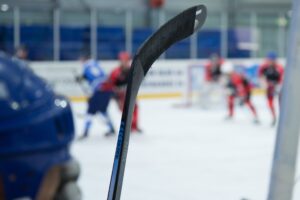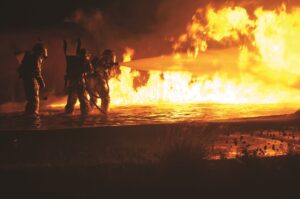
If you caught game six of the Stanley Cup’s second-round series between Boston and Columbus, you definitely remember the head hit Bruin’s defenseman Charlie McAvoy laid on Blue Jacket right winger Josh Anderson. After the hit, Anderson had to return to the locker room, but fortunately was able to return to play later in the third period. Surprisingly at the time, McAvoy only received a two-minute minor penalty for the hit that involved his shoulder and Anderson’s chin. However, after the NHL’s Department of Player Safety (DOPS) reviewed the play, McAvoy was hit with a one-game suspension.
As a result, McAvoy was required to sit out the opening Eastern Conference Finals game against the Carolina Hurricanes.
While most pundits can agree that McAvoy’s hit wasn’t malicious, the suspension was fair given the potential severity of injuries sustained from the hit. “I’m not a very good lawyer, I guess,” quipped the 14th overall 2016 draft pick. “I was just trying to make a hockey play and it was unfortunate, really…I respect the process and was glad I was able to say my peace and be able to defend myself,” explained McAvoy. When it comes to head injuries, it’s important to remember that intent is irrelevant. It doesn’t matter if a hit is malicious or totally accidental. The injuries sustained from hits to the head are now known to be far more severe than anyone could have possibly imagined back in 1875 when the first organized indoor hockey game was played in Montreal at Victoria Skating Rink.
You Can Never Be Too Safe When It Comes to CTE
Like the NFL, the NHL takes head injuries very seriously, and with good reason. In 2018, hockey legend Stan Makita died from Lewy body dementia, a degenerative brain disease. Lewy body dementia, along with Parkinson’s disease and Chronic Traumatic Encephalopathy (CTE), have been scientifically linked to repetitive brain trauma. Ironically, in addition to his stellar play and the invention of the curved stick, Makita was known for being one of the first NHL players to wear a helmet on a regular basis, long before helmet use became mandatory for players entering the league in the 1979-1980 season. Prior to that, most players only wore helmets after a head injury. Unfortunately for Stan, the damage from concussions had apparently already been done. Makita joins a growing of list former contact sport athletes who’ve suffered from dementia and acute memory loss. Tragically, a number of former NFL players have committed suicide while suffering from dementia, with Chargers/Dolphins/Patriots great, Junior Seau being one of the more well-known examples.
With new strides in safety technology being made every day, it could easily be argued that modern-day equipment has made contact sports safer. While that argument would certainly hold up if the standard of play was static from year to year, this certainly is not the case these days. Bigger hits, whether it’s in the NFL, NHL, or any other full-contact sport, are often what get the most attention. While better safety technology may give athletes greater peace of mind, it might also indirectly encourage them to put their bodies at greater risk via more aggressive gameplay. What’s even more problematic is when we see this “bigger hits are better” mentality creep its way into college, high school, or even children’s sports. Severe head trauma like CTE doesn’t discriminate according to age.


Give us a call today to discover how we can assist you.
Non-Athletes Can Suffer from TBI Too
Governing sports bodies such as the NHL are actively trying to keep players safer because it’s in everyone’s best interest to do so. However, trauma to the head in any form can have an adverse effect on a person. Traumatic brain injury (TBI) and conditions such as CTE are not limited to professional sports venues. Any person, anywhere in the country can sustain a serious head injury.
Motor vehicle accidents, slips/trips and falls, falls from heights, and being hit by falling objects are all leading causes of TBIs. These types of head injuries, particularly permanent ones, can have life-altering effects on those who suffer them. These severe types of injuries can impair a person’s ability to earn a living, communicate, move about freely, even the ability to live independently. While Josh Anderson was able to return to the game and help his team, and the severity of any injury sustained seems to have quickly subsided, a lot of vehicle accident victims and others who have sustained personal injury aren’t always as lucky.
Because TBI victims are sometimes unable to care for themselves, their injury can impact their entire family. The losses incurred by a TBI sufferer’s family may include:
- Loss of income (from the injured, as well as the family members who care for them)
- Costs of home care
- Costs of long-term care
- Costs of institutionalization
- Medical bills
- Rehabilitation costs
- Mental and emotional duress
- Loss of joy of life
- Other losses
As you can see, the cost of a TBI can be devastating. If you or a family member has suffered a traumatic brain injury that was the result of someone else’s negligence, you may be entitled to compensation for losses suffered as a result of the incident. Boston attorney and life-long Bruins fan, Christopher DiBella, knows how impactful head injuries can have on a victim’s future.
While you might not want Charlie McAvoy, who’s admittedly “not a very good lawyer,” to represent your best interests in a personal injury TBI case, it’s important for accident victims and their families to seek the counsel of an experienced Boston brain injury attorney who can help sort through the various challenges that will be faced and the recovery that will be needed in order to bring a semblance of normalcy back to your life. For over a decade, the legal team at DiBella Law Injury and Accident Lawyers has been helping Burlington injury victims recover for their losses. If you or a loved one has been injured and you’d like a free case evaluation, don’t hesitate to contact our firm at (978) 327-5140 for more information.


We are committed to providing valuable information and resources to assist you.





